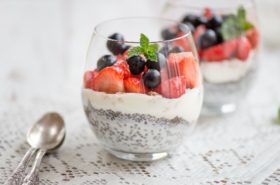You’ve probably heard the saying countless times that “breakfast is the most important meal of the day”. There is good research suggesting that having a nutritious breakfast in the morning is important for healthy weight management, enhanced mood, improved concentration and overall wellbeing.
Healthy weight management
Eating behaviours and level of physical activity play a vital role in weight control management. Starting your day with a nourishing breakfast full of essential vitamins, minerals and fibre will help stabilise your blood sugar levels while at the same time keep you satisfied for longer and prevent wanting to snack on the wrong foods mid-morning. Glycogen stores become low during sleep when our body works hard to repair and rebuild itself. Eating healthy carbohydrates helps restore your energy levels and kick starts your metabolism for the day. However the opposite is true when you skip breakfast. Your body’s metabolism slows down and you run the risk of gaining weight.
Enhanced mood & Improved concentration
Several studies suggest that those who eat a good breakfast enjoy a better health and overall wellbeing than those who skip their breakfast. Enjoying breakfast is particularly associated with improved cognitive performance, memory, mood, creativity, and fewer mental health and digestive Problems.
Better Nutrition
Foods we eat for breakfast are different compared to lunch and dinner. If you skip breakfast, chances are you could be missing out on much needed nutrients and not meeting your daily intake needs. Breakfast is also an opportunity to eat fortified foods containing folate, iron, fibre, and B vitamins.
What a balanced breakfast should contain

Whole-grains
Whole grains are important for weight management. They help protect against heart disease and reduce the risk of developing type 2 diabetes. High-fibre whole grains help improve healthy gut bacteria and stimulate regular bowel movements, important for removing toxins from the body. Oats, quinoa, rice, puffed whole grains, whole grain breads and breakfast cereals are some excellent examples of high fibre foods.
Fibre
Fruits are high in fibre, contain anti-oxidants, and boost the immune system to promote health and prevent disease. Fibre from fruits and vegetables is important for proper digestion and can have cholesterol-lowering effects.
Protein
Protein is a great way to fuel your body after a nights rest. Adding protein will keep you feeling satisfied throughout the morning so you are less likely to reach for an unhealthy snack. Some high protein breakfast foods are eggs, good quality protein powder, quinoa, oats, nuts and seeds, and soy products.
Calcium
An average adult needs 1,000mg of calcium per day and children 800mg. Calcium is important especially for children because it helps to build healthy bones as well as maintain bone strength. Foods such as milk, legumes, certain nuts, dried fruits such as figs and apricots, fortified soy beverages and breakfast cereals contain calcium.
How to make breakfast part of your morning routine
Some of us skip breakfast because we don’t have enough time in the morning, are too tired or lack motivation. Others may not have enough nutritious food in the house or lack the cooking skills to prepare a wholesome meal.
Here are some suggestions to make breakfast part of your routine.
- Set your alarm earlier to allow enough time for breakfast
- Make something the night before, store in a jar or container so you can grab a healthy breakfast on the go.
- Start to get creative in the kitchen and experiment with new and exciting breakfast recipes.
- Get the family involved.
Consuming a balanced breakfast is a healthy daily habit to maintain throughout life. It provides the brain with much needed energy to approach daily tasks with focus and ease. Children especially benefit from eating a nutritious first meal that gives them energy for the day ahead. Having a healthy breakfast routine will most likely ensure you continue to make healthy diet choices throughout the day and therefore maintain a healthy body and mind.
References
Chung SJ, Lee Y, Lee S, Choi K. Breakfast skipping and breakfast type are associated with daily nutrient intakes and metabolic syndrome in Korean adults. Nutrition research and practice. 2015 Jun 1;9(3):288-95.
Defeyter MA, Russo R. The effect of breakfast cereal consumption on adolescents’ cognitive performance and mood.
Mameli C, Galli E, Dilillo D, Alemanno A, Catalani L, Cau S, Fransos L, Lucidi F, Macrì A, Marconi P, Mostaccio A. Psychosocial, behavioural, pedagogical, and nutritional proposals about how to encourage eating a healthy breakfast. Ital J Pediatr. 2014 Aug 13;40(1):73.
National Health and Medical Research Council (2013) Australian Dietary Guidelines. Canberra: National Health and Medical Research Council.
Smith AP. An investigation of the effects of breakfast cereals on alertness, cognitive function and other aspects of the reported well-being of children. Nutritional neuroscience. 2010 Oct 1;13(5):230-6.









